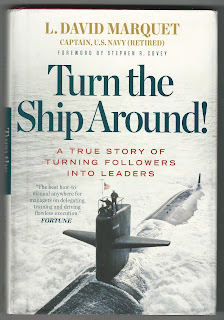For me, the theme was leadership seen through the experiences of 2LT (eventually Major) Dick Winters. The corollaries included the importance of training, and the bonds that we form by facing challenges together. When my wife was out of town visiting relatives, I made the time to watch Band of Brothers. Then, I read the book. The movie was a good instantiation. The book provided more depth and detail. The advantage to the DVDs is being able to watch the words and run it back to catch what you missed. I renewed the book twice and checked it out again. And I still watch episodes again when I have the theater to myself. I cannot imagine seeing this once on HBO-TV and getting half as much from it.
Producers Tom Hanks and Steven Spielberg hired good writers and directors who developed and projected additional dimensions from Stephen Ambrose’s history. But that history is the foundation. And Ambrose relies on other works such as The Face of Battle (John Keegan; Penguin), The Warriors: Reflections on Men in Battle (J. Glenn Gray, University of Nebraska Press), and Rendezvous with Destiny: A History of the 101stAirborne Division (Leonard Rapport and Arthur Northwood, Jr., Infantry Journal Press). In the Acknowledgements and Sources, Ambrose explains how the book came to be written in response to criticisms from the men of Easy Company. Ambrose was employed by the Eisenhower Center at the University of New Orleans. At the time he met the men of the 506thParachute Infantry Regiment, he was working on a biography of Richard Nixon. As a result of that initial meeting, Ambrose met the men many times to record and review the interviews that are the bedrock of the book and therefore the HBO series.
 |
| Actor Shane Taylor (b. 1974) portrayed T-4 Eugene "Doc" Roe. |
Based on the personal remembrances that highlight each episode, actor Damian Lewis (English, upper class, and Eaton according to IMDB here) did yeoman’s duty portraying Richard Winters. The other actors all created or re-created their characters well enough, even though I feel that they were all too old for their roles. Acting is hard work and it takes practice. So, finding competent teenagers for this was apparently impossible. But that’s who they were: kids. By the time they jumped at Normandy, 1LT Dick Winters was 26. Their nemesis Capt. Herbert Sobel was thirty when he drilled them at Camp Toccoa.
Capt. Sobel (Wikipedia here) gets better treatment in the book than in the movie. According to Wikipedia, it was his son, Michael, who came to his defense in the courtroom of history. In the book, some of the men of Easy Company say that his training at Taccoa kept them alive in Europe. In the movie, we see only the martinet who can neither read a map himself, nor allow his NCO to do it for him. That being as it may, even in the unarmed forces of the state guard, we fight as we train and we train as we fight. I know from personal experience that units who bust their humps together at drill are competent to serve the people of Texas. Individuals who sit around, drink coffee, and swap lies are hospitalized when the event surpasses their expectations.
On another level, the men of Easy Company were just being reflective and gracious. No one had to specially thank Major Dick Winters because his leadership was humane, just, fair, forthright, foresighted, and insightful – and demanding. He was a good combat officer. But why was he? We can investigate all of the parameters of personality—all of the aspects of environment and heredity—and never reduce the problem to a single cause or even to a matrix of elements. The fact remains that he was.
As an extreme circumstance, war sets the stage for drama, and every story is a mirror. Some reflect better than others. As an epic, the HBO production of Band of Brothers is a hallway of dark and light, metal and glass, orthogonal and angular. The book is a map of that concourse.
PREVIOUSLY ON NECESSARY FACTS



